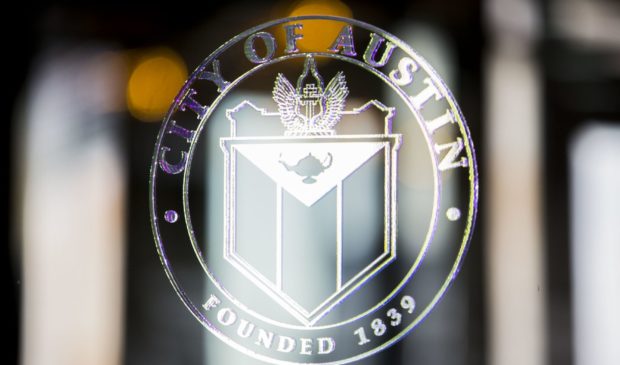Photo by Gabriel C. Pérez/KUT
Austin passes $4.5 billion budget, increases police budget per state law
Friday, August 13, 2021 by
Audrey McGlinchy, KUT Austin city leaders approved a new budget that boosts spending on policing and puts dollars toward public transit planning and housing.
All told, City Council members OK’d a $4.5 billion budget Thursday evening, representing a 7 percent increase over the current budget. The city’s fiscal year begins Oct. 1.
“We unanimously passed a budget today that tackles the pandemic (and) increases our public safety investments,” Council Member Greg Casar, who represents parts of North Austin, said after the vote. “I really appreciate everything my colleagues brought forward and the way we came together in this important budget.”
Five Council members joined the meeting remotely, while the other six met in City Hall chambers.
Here is a small slice of how the money’s being allocated: $6.2 million to train new police officers, $2.4 million to fund 18 positions to staff an office overseeing Austin’s public transit initiative and $2.3 million to subsidize affordable housing projects.
Council members also approved a 2 percent raise for city employees, with a one-time stipend of up to $1,000 depending on the employee’s current salary and work hours.
While budget staffers have at times worried about shortfalls caused by the effects of the pandemic, City Manager Spencer Cronk presented a much more optimistic picture of the city’s financial situation when he unveiled a draft budget last month. That’s thanks, in part, to the city’s sales tax earnings, which he said were higher than originally anticipated.
“Economically, Austin, Texas, has come through the many challenges of the past year in as good or better shape than any big city in America,” Cronk said in July. “Our local economy is fundamentally strong and performed unexpectedly well during the Covid pandemic, with more positive impacts for our budget than we anticipated even a few months ago.”
But as Council members readied their final approval of a budget this week, they had to grapple with the realities of a state law passed in 2019, which lowered the amount of new property taxes cities can collect each year. If cities want to go above the 3.5 percent limit, they have to get voter support.
Staff with Austin’s budget office have warned that the city could fall short of funding basic city services by millions in the coming years if it doesn’t hold elections to raise more property taxes.
“Just trying to keep the lights on, we have deficits,” Ed Van Eenoo, Austin’s chief financial officer, said. “I would anticipate tax-rate elections in our future.”
This year, though, is a little different. Because of the winter storm in February, the governor temporarily suspended the requirement to hold an election before collecting more property taxes than the state normally allows.
Council members took advantage of this, voting to increase the city’s total property tax revenue by 4.7 percent.
Council Member Mackenzie Kelly, who represents far Northwest Austin, was reluctant to go this high.
“I voted in favor of the budget today with mixed emotions,” she said. “I was concerned about the tax burden that we were placing on residents during a time when so many have been impacted by Covid-19 and other economic challenges.”
While Austin’s property tax coffers will be fuller than in years past, the city estimates the impact on individuals’ property tax bills will be slight.
City staffers estimate the owner of a home valued at $400,000 will save approximately $17 on their annual property tax bill. Any actual savings, though, depends on how a property value fared in the past year, and it likely rose significantly; the median sales price of a home in Austin has increased by $100,000 since the start of the year.
These projections take into account a 20 percent homestead exemption, which Council members approved earlier this year.
The majority of the city’s $1.2 billion General Fund – think of this like the city’s checking account – is being spent on public safety, including police, fire and EMS. The police department’s budget is the largest of the three, totaling just over $442 million.
This marks a significant increase to last year’s budget, as the city reacts to a new state law that financially penalizes a city if it decreases funding for police. Gov. Greg Abbott made passing such a law a priority after Austin City Council members, in response to citizen demands for police dollars to be invested in other services such as housing and health care, cut about $130 million from the police department last year.
Most of that money didn’t go toward anything new; it was spent on several divisions that were moved out from under the police department, including the forensic science lab and the 911 call center. As Austin restores police funding, those divisions will return to the police department.
This story was produced as part of the Austin Monitor’s reporting partnership with KUT.
The Austin Monitor’s work is made possible by donations from the community. Though our reporting covers donors from time to time, we are careful to keep business and editorial efforts separate while maintaining transparency. A complete list of donors is available here, and our code of ethics is explained here.
You're a community leader
And we’re honored you look to us for serious, in-depth news. You know a strong community needs local and dedicated watchdog reporting. We’re here for you and that won’t change. Now will you take the powerful next step and support our nonprofit news organization?









